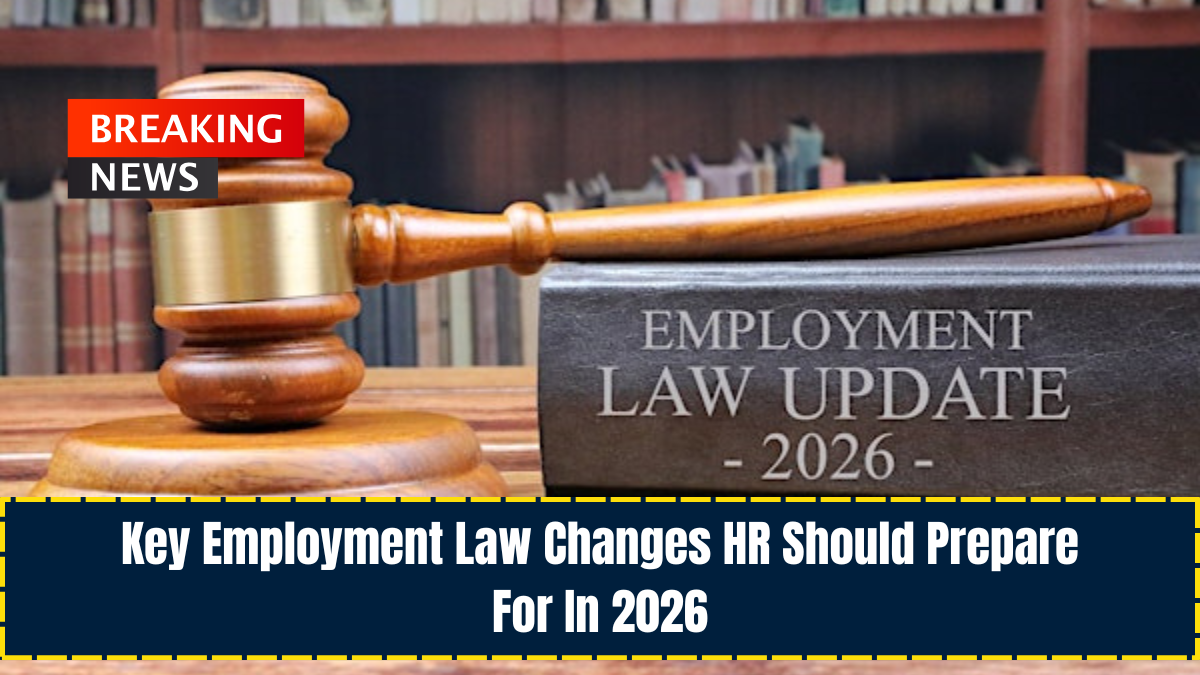Staying compliant with evolving workplace regulations remains one of the most challenging yet critical responsibilities for HR professionals. Key Employment Law Changes HR Should Prepare For In 2026.
With January 1 and July 1 traditionally marking major implementation dates for new state laws, now is the ideal time for HR teams to review updates from the past year, ensure current compliance, and brace for significant changes taking effect January 1, 2026.
This guide outlines the most impactful legal developments arriving at the start of the year, plus practical preparation steps for HR leaders.
Looking Back At 2025: Major Shifts In Employment Law
Federal Policy Reset With A New Administration
The start of 2025 saw major reversals in employment policy at the federal level. The new administration:
- Ended the effort to implement a federal ban on non-compete agreements
- Abandoned efforts to raise exempt-salary minimums
These issues, heavily litigated in the final months of the Biden presidency, suddenly became non-issues in 2025.
Overall, federal regulatory activity from agencies such as the NLRB and Department of Labor slowed considerably, suggesting fewer major federal changes heading into 2026.
State-Level Developments: 2025’s Most Significant Trends
Sick Leave Laws Expand Rapidly
Sick leave was one of the most active legislative categories in 2025:
- Michigan finally enacted a long-delayed sick leave requirement with phased implementation.
- Missouri passed, activated, and then repealed a statewide paid sick leave law in the same year.
- Nebraska introduced new sick leave rules beginning October 1.
- Multiple states expanded existing leave programs with additional qualifying reasons and longer leave durations.
This trend shows no sign of slowing, and sick leave compliance is becoming increasingly local, complex, and fast-moving.
Growth In AI Regulation, Wage Transparency, And Protected Classes
States including California, New Jersey, Illinois, and Colorado advanced laws governing:
- Employer use of artificial intelligence
- Expanded pay transparency requirements
- Additions of new protected characteristics in anti-discrimination laws
These themes will continue shaping employment compliance in 2026.
January 1, 2026 Changes: Minimum Wage & Non-Compete Laws
Minimum Wage Hikes Across Multiple States
Many states and cities will introduce new minimum wage rates starting January 1, 2026:
- Arizona: $15.15/hr
- California: $16.90/hr
- Colorado: $15.16/hr
- Connecticut: $16.94/hr
- Hawaii: $16/hr
- Maine: $15.10/hr
- Michigan: $13.73/hr
- Minnesota: $11.41/hr
- Missouri: $15/hr
- Montana: $10.85/hr
- Nebraska: $15/hr
- New Jersey: $15.92/hr
- New York: $16/hr
- Ohio: $11/hr
- Vermont: $14.42/hr
- Virginia: $12.77/hr
- Washington: $17.13/hr
Major local increases include:
- Denver, CO: $19.29/hr
- Seattle, WA: $21.30/hr
- New York City / Suffolk / Westchester: $17/hr
These increases matter beyond direct wages, as they can also trigger changes in:
- Exempt employee classifications
- Non-compete eligibility thresholds
Rising Non-Compete Salary Caps
Several states restrict non-compete agreements to high-earning workers. Because thresholds are tied to federal or state economic indicators, the qualifying salary level will increase in early 2026 in:
- Colorado
- Maine
- Maryland
- Rhode Island
- Oregon
- Washington
- Washington, D.C.
Existing agreements may become unenforceable if employees fall below new salary requirements, meaning employers may need to issue updated contracts.
Family & Medical Leave: New Expansions In 2026
Unpaid FMLA Rules Grow In Several States
Key changes for 2026 include:
- Lower employer-size thresholds
- Longer allowable leave periods (beyond 12 weeks)
- New qualifying reasons, including genetic testing and specialized medical care
Paid Family & Medical Leave Programs Expand
Paid family leave continues growing as one of the biggest state-level employment trends. Thirteen states plus D.C. now operate payroll-funded programs.
Notable additions beginning January 1, 2026:
- Colorado: Up to 12 extra weeks for NICU-related care
- Rhode Island: Caregiver leave increases from 7 to 8 weeks
- Washington: Expanded eligibility and enhanced job protections
These changes affect:
- Payroll configuration
- Leave administration
- Employee communication
- Policy updates
Ongoing program refinements mean additional adjustments are likely throughout 2026.
Pay Transparency And Wage Statement Requirements
Many states implemented new transparency laws in 2025, including:
- Illinois
- New Jersey
- Ohio (Cleveland)
- Delaware
- Vermont
- Massachusetts
- Washington
Common requirements include:
- Posting salary ranges in job listings
- Including benefit details
- Keeping wage and job-history records
- Providing reports to state agencies
California’s New Rules For Job Postings (Jan. 1, 2026)
Employers must now include:
- A good-faith total compensation estimate
- All compensation types (bonus, benefits, stock, etc.)
- Three-year record retention requirements
Additional Wage Document Changes
- Oregon (Jan. 1, 2026): Employers must provide written explanation of all compensation and deductions at hiring, with annual updates available to employees.
- Ohio (April 9, 2025): Expanded pay stub requirements including overtime and hours worked for hourly staff.
AI And Workplace Discrimination: A Major Focus For 2026
Most current AI legislation focuses on preventing algorithmic discrimination in employment decisions.
Colorado’s Artificial Intelligence Act
Effective June 30, 2026, employers using high-risk AI must show they have taken steps to prevent discrimination by:
- Conducting bias audits
- Publishing disclosures
- Maintaining risk-management frameworks
- Reporting discrimination to affected individuals and the state
California And Illinois Strengthen Enforcement
Both states clarified that:
- Existing anti-discrimination laws apply equally to AI-driven decisions
- Employers are responsible for AI outcomes
- California now requires data documentation and offers liability protection for employers who conduct bias testing
New Jersey has implemented similar interpretations, and more states are expected to follow.
HR leaders using AI tools in:
- Hiring
- Screening
- Promotions
- Performance evaluation
must ensure systems are transparent, documented, and regularly audited for fairness.
Employment regulations are evolving faster than ever, with minimum wages, non-compete rules, paid family leave programs, pay transparency mandates, and AI oversight all expanding in 2026.
HR teams must be proactive, continuously updated, and equipped with tools that can adapt to ongoing legal complexity.
The organizations that invest in compliance readiness now will be best positioned to protect their workforce and avoid costly violations in the year ahead.




